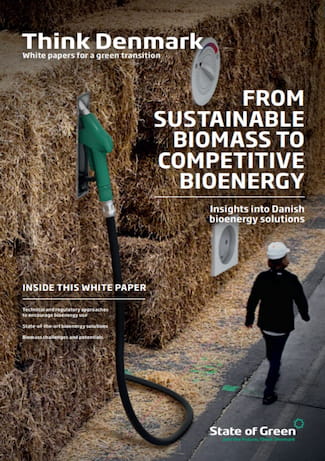Download our publication on bioenergy today
This article is part of our publication ‘Bioenergy’.
Download nowPerspective
Biogas
Biomass


According to new 2014 export figures for energy technology, released by the Danish Energy Industries Federation, Danish energy technology companies increased their exports with 10.7% compared to 2013. Bioenergy technologies, systems and solutions play a pivotal part.
Transforming sustainable biomass resources into competitive bioenergy products such as heat, power, biogas and biofuels is essential to undertake a green changeover and shift energy supply from fossil fuels to renewable energy sources.
Within bioenergy, particularly technologies associated with CHP (combined heat and power) plants based on biomass combustion and waste incineration are experiencing increased international attention and demand. For instance Babcock &Wilcox Vølund, that you can read more about in this white paper, exports 85% of the installations developed and manufactured by the company. Same success can be found at BWE and BWSC, which have secured orders for two turnkey power plants, Brigg and Snetterton, based on technologies that allow greater fuel flexibility by burning straw and miscanthus in combination with wood chips. Both projects, Brigg and Snetterton, are carried out in joint ownership between PensionDenmark, a Danish pension fund, and BWSC with BWSC as operations and maintenance (O&M) provider for 15 years.
In a greater international perspective, we see a great demand for energy-efficient waste incineration plants in the U.K, as well as growing interest in the United States, Singapore and from our Scandinavian neighbours. As for CHP installations, the international trend is that customers are seeking turn-key installations where providers develop, construct and then service the plants. From an EU perspective, implementing these projects poses a challenge because regulations and incentives differ among EU member states. Thus every project must undergo stringent analysis to verify the business case. As for waste treatment within EU, the speed with which member states implement targets and regulations postpones the penetration of responsible handling of waste. A more stringent implementation would increase the possibilities to offer sustainable Danish solutions. In general, common EU rules is a driver for the implementation of these technologies, and for Danish companies to share their competences within technological solutions, energy and waste systems and advice.
In Denmark, energy and district heating companies are converting central power plants on a grand scale from coal to biomass and building new district heating plants based on biomass. The mostly used biomass are wood pellets and wood chips, but Denmark is among the few countries in the world that also uses straw in large power plants, something that is gaining increased interest abroad. Many plants have already been converted and more operators are on the way. A major incentive for energy companies is that biomass in Denmark is not taxed as oil, coal and natural gas. That makes it economically attractive while at the same time companies contribute to the green changeover.

This article is part of our publication ‘Bioenergy’.
Download now